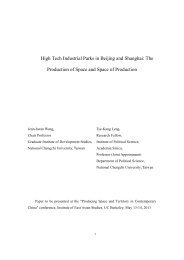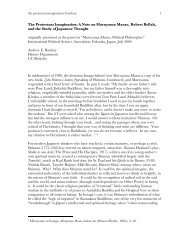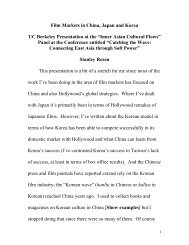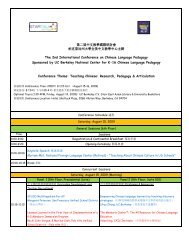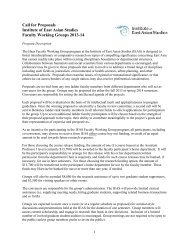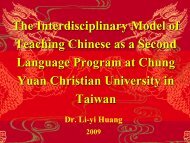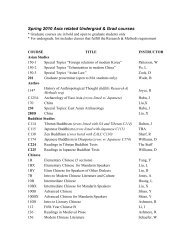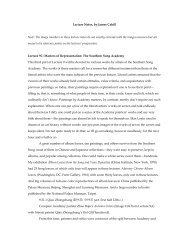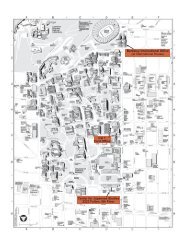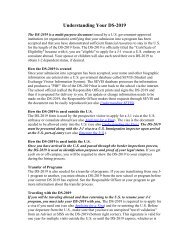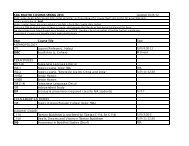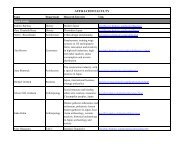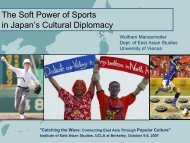Third Edition Spring 2013 - Institute of East Asian Studies, UC ...
Third Edition Spring 2013 - Institute of East Asian Studies, UC ...
Third Edition Spring 2013 - Institute of East Asian Studies, UC ...
You also want an ePaper? Increase the reach of your titles
YUMPU automatically turns print PDFs into web optimized ePapers that Google loves.
At the same time, Suharto’s rule, and in particular the latterhalf <strong>of</strong> his rule(1980s – 90s), was characterized by a “strengthening<strong>of</strong> state power” and a “steady weakening <strong>of</strong>… society-basedforces” like NGOs. 6 Although civil society actors were relatively activein the first half <strong>of</strong> Suharto’s regime (mid 1960s-70s), beginningin the 1980s, Suharto’s government engaged in a series <strong>of</strong> actionsaimed at the “de-ideologisation” and “de-politicisation” <strong>of</strong> NGOs,in an attempt to curtail their political activities. 7 For example, itestablished the principle <strong>of</strong> perwadahkan tunggal (the only, rightfulplace) 8 whereby all NGOs were required to form an umbrellaorganization through which the government would carry out its“duties” <strong>of</strong> pembinaan (guidance) and pengembangan (development).9 This effectively meant that the government was able tomonitor and curtail the activities <strong>of</strong> NGOs as it pleased. The governmentalso passed the Law on Social Organizations (No. 8/1985) in1985, which further increased its ability to control NGOs. This lawrequired all NGOs to register with the government, placed restrictionson foreign funding that an NGO could receive, and gave thegovernment the ability to dissolve any NGO that disrupted “publicorder and security.” Significantly, the vagueness <strong>of</strong> this last phrasegave the government wide rein to revoke the license <strong>of</strong> any NGO atwill. 10However, even during this period, Indonesian ENGOs hadsome success in publicly advocating for more environmental regulationand stricter enforcement <strong>of</strong> these regulations by the Suhartoregime. For example, in 1989, WALHI (the Indonesian NongovernmentalForum for the Environment, the umbrella organizationfor ENGOs in Indonesia) took Indorayon, one <strong>of</strong> the largest government-backedpulp and paper companies, to court for allegedlyronmental issues in Indonesia,” in Ecological Change in Southeast Asia, ed. AnnamariAntikainen-Kokko (Turku, Finland: Abo Akademi University, 1998), 8.6 Jamie Mackie and Andrew MacIntyre, “Politics,” in Indonesia’s New Order, ed.Hal Hill (Honolulu: University <strong>of</strong> Hawaii Press, 1994): 3-4.7 Bob Hadiwinata, The Politics <strong>of</strong> NGOs in Indonesia (New York, NY: Routledge-Curzon, 2003), 94.8 Joseph Gordon, “NGOs, the Environment and Political Pluralism in New OrderIndonesia,” Explorations in Southeast <strong>Asian</strong> <strong>Studies</strong> 2 (1998): 5.9 Hadiwinata, Politics <strong>of</strong> NGOs, 94.10 Gordon, “NGOs, the Environment and Political Pluralism” 13.violating the environmental regulation that environmental impactassessments must be carried out before beginning development. 11Although WALHI lost the court case on a technicality, through thecase it managed to establish the right <strong>of</strong> NGOs to sue the governmentto force it to implement or enforce its own laws.Moreover, there is evidence that the Suharto governmentwas actually constrained by the advocacy <strong>of</strong> ENGOs. For example,in June 1990, the government decided to establish an EnvironmentalControl Agency (Bapedal) that subsequently went on to enforceindustrial pollution regulations in an unprecedentedly aggressivemanner. The reason for this became clear when the IndonesianAssistant Minister for the Environment admitted that “increasingNGO pressure” was one <strong>of</strong> the main reasons for the zeal shown byBapedal in prosecuting hundreds <strong>of</strong> companies. 12So why were ENGOs able to exist and function in Indonesiaeven though they <strong>of</strong>ten worked against the Suharto regime? I arguethat the fundamental cause for the ENGOs’ success was internationalpressure on the Suharto regime to address the environmentaldamage that its extractive economic policies had caused. This pressure,combined with increasing government debt in the 1980s as aresult <strong>of</strong> falling oil prices, worked to constrain the Suharto regime’ssuppression <strong>of</strong> ENGOs through two main mechanisms: 1) the regimewas forced to rely on ENGOs’ resources to address extensiveenvironmental damage and thus could not afford to suppress themcompletely, and 2) support from powerful foreign governmentsand international NGOs for the work <strong>of</strong> Indonesian ENGOs made itharder for Suharto to suppress ENGOs. My argument will focus onthe mobilization and activities <strong>of</strong> ENGOs in Indonesia in the 1980sand 1990s, up to Suharto’s resignation in 1998, because during thisperiod NGOs were the most constrained by the Suharto regime.11 Lipschutz, Global Civil Society, 199.12 James Riker, “Linking Development From Below to the International EnvironmentalMovement: Sustainable Development and State-NGO Relations in Indonesia,”Journal <strong>of</strong> Business Administration 22-23 (1994): 160.43 Rachel Phoa Environmental NGOs in Indonesia 44



